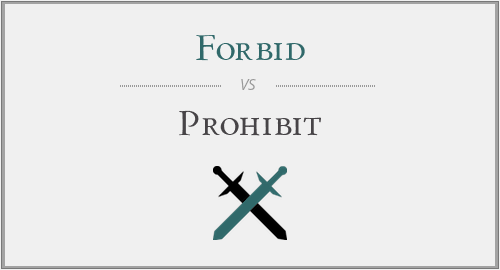Forbid vs. Prohibit: Navigating Distinctions in Restriction
Understanding the differences between "forbid" and "prohibit" involves recognizing variations in language and the nuances of restriction. This article aims to clarify the distinctions between "forbid" and "prohibit," shedding light on their meanings, applications, and appropriate usage in different contexts.
Correct Usage:
Forbid:
"Forbid" is a verb that means to command someone not to do something, to impose a prohibition or restriction on a specific action. It conveys the idea of issuing an explicit order against a particular behavior, often with a sense of authority or parental control.
Prohibit:
"Prohibit" is also a verb that means to formally or officially forbid something. It implies the establishment of a rule, law, or regulation that prevents or restricts a certain action. "Prohibit" is often associated with legal or institutional restrictions.
Meanings and Applications:
Forbid:
Use "forbid" when describing the act of commanding or ordering someone not to do a specific action. "Forbid" often carries a personal or authoritative tone, and it may be used in various contexts, including parental instructions or informal settings.
Prohibit:
Use "prohibit" when indicating a formal or official restriction imposed by rules, laws, or regulations. "Prohibit" is commonly used in legal, institutional, or authoritative contexts to denote a broader and more systematic form of restriction.

Examples:
Correct: The teacher forbade the use of cell phones during the exam.
Correct: The law prohibits the sale of alcohol to individuals under the age of 18.
Contextual Considerations:
Consider the level of formality and the nature of the restriction when choosing between "forbid" and "prohibit." "Forbid" may be more suitable for personal or informal situations, while "prohibit" is often used in legal or institutional contexts.
Conclusion:
Navigating the distinctions between "forbid" and "prohibit" involves understanding their roles in expressing restrictions. Whether issuing a personal command or enforcing a legal regulation, using the appropriate term enhances precision and clarity in communication.




Have a discussion about this article with the community:
Report Comment
We're doing our best to make sure our content is useful, accurate and safe.
If by any chance you spot an inappropriate comment while navigating through our website please use this form to let us know, and we'll take care of it shortly.
Attachment
You need to be logged in to favorite.
Log In